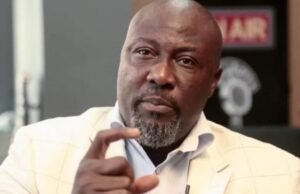The first day of the new US Congress descended into turmoil on Friday as right-wing Republicans defied President-elect Donald Trump by blocking Louisiana congressman Mike Johnson’s bid to return as Speaker of the House of Representatives.
Johnson, buoyed by multiple endorsements from Trump, required a simple majority to secure the role as Washington’s top legislator, a position that places him second in line to the presidency.
However, internal divisions among Republicans led to a failure to elect a speaker in the initial round of voting, sparking fears of prolonged gridlock reminiscent of recent House disruptions.
The impasse serves as another blow to Trump, whose influence over House Republicans has been challenged twice in recent months, first during their resistance to his demand for a suspension of the borrowing limit in December.
With Trump’s inauguration set for Monday, the stakes in the speakership battle are high, as no legislative action, including the certification of Trump’s election victory, can proceed without a speaker.
Johnson, who needed 218 votes in the closely divided House, secured 216 votes compared to Democratic leader Hakeem Jeffries’ 215.
However, he fell short of a majority due to three Republicans abstaining. If the contest drags on, moderate Republicans may explore alternative candidates, jeopardizing Johnson’s chances and potentially losing Trump’s backing.
Despite Trump’s social media encouragement, where he wished Johnson “Good luck” and praised his nearly unanimous support, the congressman faced resistance within his party.
“He won by being the least objectionable candidate, and he no longer possesses that title,” tweeted Representative Thomas Massie of Kentucky, a known critic of Johnson.
Johnson, a 52-year-old attorney, sought to appeal to conservatives with a promise to “reduce the size and scope of the federal government, hold the bureaucracy accountable, and move the United States to a more sustainable fiscal trajectory.”
However, his bipartisan track record and perceived softness on deficit issues alienated key factions within his party. Massie was among the first to oppose Johnson publicly, joined by other hard-liners dissatisfied with Johnson’s leadership style and legislative priorities. Johnson’s alliances with Democrats during the 2023–25 session further fueled mistrust among fiscal hawks and Trump loyalists.
The Republicans’ inability to coalesce around a single candidate is reminiscent of the January 2023 speaker elections, which required multiple rounds of voting — a scenario not seen since 1923. If subsequent ballots fail, the door may open to backroom negotiations between Republicans and Democrats to install a compromise candidate. House Whip Steve Scalise, a steadfast Trump ally with his own leadership aspirations, could emerge as a contender despite his recent health challenges.
However, Scalise’s history of being rejected by the party’s right-wing factions suggests he may face the same resistance as Johnson. The Judiciary Committee Chairman Jim Jordan, a favorite among conservative hard-liners, could also be a potential choice. However, no credible Republican alternative has yet been proposed publicly.
As tensions escalate, Massie’s remarks on Johnson’s earlier success underscore the mounting frustration within the party: “He was only electable the first time because he hadn’t held any type of leadership position, nor had he ever fought for anything, so no one disliked him and everyone was tired of voting.”
With no immediate resolution in sight, the House remains paralyzed, and the spotlight now shifts to whether Republicans can overcome their divisions to elect a speaker and proceed with legislative business.










